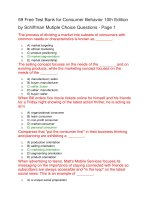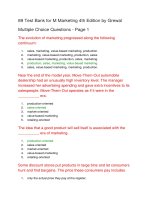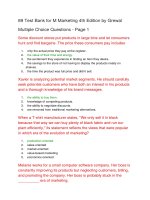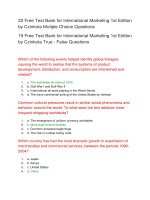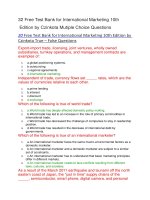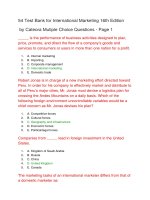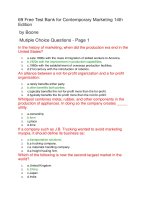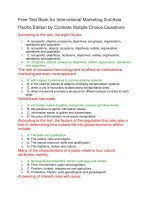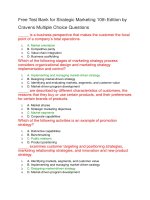Test bank for international marketing 10th edition
Bạn đang xem bản rút gọn của tài liệu. Xem và tải ngay bản đầy đủ của tài liệu tại đây (67.18 KB, 10 trang )
Test Bank for International Marketing 10th Edition
True - False Questions
International specialization and cross-sourcing have made
production much more efficient.
1.
2.
True
False
Trade flows outnumber currency flows by 100 to 1.
1.
2.
True
False
World trade has brought about a global reorientation of
corporate processes.
1.
2.
True
False
The level of trade is now determined by exchange rates.
1.
2.
True
False
Market saturation can be avoided by lengthening or
rejuvenating product life cycles in other countries.
1.
2.
True
False
Many firms do not participate in the global market because
their managers believe that international marketing
should only be carried out by large multinational
corporations.
1.
2.
True
False
Firms are fairly consistent in their international activities
because of the similarities in their levels of experience,
resources, and capabilities.
1.
2.
True
False
Currency flows and exchange rates have a greater effect on
trade than government monetary policies.
1.
2.
True
False
World trade has assumed an importance heretofore
unknown to the global community and as a result,
many countries and firms have found it highly
desirable to become major participants in international
marketing.
1.
2.
True
False
International marketing is unable to retain the basic
marketing tenets of value and exchange.
1.
2.
True
False
Policymakers restrict the impact of global trade and financial
flows by eliminating tariffs and quotas.
1.
2.
True
False
The network of global linkages that bind us all as a result of
world trade were first recognized during the rebuilding
of Europe after WWII.
1.
2.
True
False
Due to ongoing global technological innovation in marketing,
products are distributed at a higher cost.
1.
2.
True
False
Only those who participate in the transactions are exposed
to international marketing and subject to its changing
influences.
1.
2.
True
False
The role of government in the marketplace is decreasing
dramatically.
1.
2.
True
False
It is in the domestic marketing field where one can observe
most closely the role of marketing as a key agent of
societal change.
1.
2.
True
False
The level of global investment has resulted in a decrease in
international debt by governments.
1.
2.
True
False
To achieve success in the art of international marketing, it is
necessary to be firmly grounded in its scientific
aspects.
1.
2.
True
False
Constant rapid technological change and vast advances in
communication permit firms and countries to quickly
emulate innovation and counteract carefully designed
plans.
1.
2.
True
False
Global investment strategies, coupled with production and
distribution sharing, increase the challenge of staying
in a leadership position.
1.
2.
True
False
Mutiple Choice Questions
Which of the following has traditionally been a domestic
issue and is now an international issue?
1.
2.
a.Geographic boundaries of cities
b.The flow of water through dam diversion tunnels
3.
4.
c.Applications for government subsidies
d.Agriculture and farm policies affecting imports and exports
Measures such as quotas and import regulations have been
restrained by international agreements that regulate
trade restrictions, particularly through the _____.
1.
2.
3.
4.
a.World Bank
b.United Nations Trade Mission
c.World Trade Organization
d.IMF
The trading bloc NAFTA is located in _____.
1.
2.
3.
4.
a.Asia
b.Europe
c.South America
d.North America
The _____, which was founded in 1944, has recently been
assisting nations that used to be categorized as
“wealthy.”
1.
2.
3.
4.
a.International Monetary Fund
b.World Trade Organization
c.World Health Organization
d.European Union
By erecting barriers, designing quotas, and implementing
other import regulations, governments have attempted
to:
1.
2.
3.
4.
a.prevent illegal trade across borders.
b.restrict the impact of global trade and financial flows.
c.increase the income of the government.
d.capitalize on technology and enforce worldwide standards.
As a result of the March 2011 earthquake and tsunami off the
north eastern coast of Japan, the “just in time” supply
chains of the _____, semiconductor, smart phone,
digital camera, and personal computer industries were
immediately jeopardized around the world.
1.
2.
3.
4.
a.textile
b.automotive
c.healthcare
d.cosmetic
Which of the following statements is true about the role of
international markets?
1.
a.Those who do not participate in the transactions are not exposed to international
marketing and are not subject to its changing influences.
2. b.International markets can become a source of needs satisfaction.
3. c.International markets cannot influence the quality of life of individuals.
4. d.International markets can simplify the process and eliminate complex business
decisions.
Which of the following new technologies has allowed
consumers to supply and receive products from
across the world for personal use?
1.
2.
3.
4.
a.Travelogues on cable television
b.The Internet
c.Automated pensions and individual retirement accounts
d.Newly created niche markets
One way to guard against market saturation of a product is
to:
1.
2.
3.
4.
a.lower interest rates.
b.delay introduction of a new product.
c.personalize the message to the customer.
d.lengthen or rejuvenate product life cycles in other countries.
The shifts in financial flows due to global investments have
resulted in:
1.
2.
3.
4.
a.more complex procedures to avail foreign capital.
b.more foreign-direct activities.
c.decreased international debts by governments.
d.increased rates of unemployment.
Which of the following is true regarding the domestic
repercussions of global linkages?
1.
a.Policy makers find it easier to isolate domestic economic activity from
international market events.
2. b.Governments have gained more power to implement effective policy measures.
3. c.Private-sector financial flows exceed the financial flows that can be marshaled
by the government.
4. d.Policy makers have more effective tools but less responsibilities to carry out.
Which of the following is true about global investments?
1.
a.They have brought about interdependence between nations which is stable in
nature.
2. b.They have made past trade orientations more relevant in today’s changing
times.
3.
c.They have reduced the role of manufactured goods and services in the
international market.
4. d.They have made it increasingly difficult to differentiate between “rich” and “poor.”
Export-import trade, licensing, joint ventures, wholly owned
subsidiaries, turnkey operations, and management
contracts are examples of:
1.
2.
3.
4.
a.global positioning systems.
b.outsourcing.
c.regional agreements.
d.international marketing.
Advances in technology have:
1.
a.complicated the distribution channel thereby making distribution a lengthy
process.
2. b.allowed firms to separate their activities by content and context.
3. c.enabled firms to operate in a marketplace rather than a market space.
4. d.made the procurement of raw materials an expensive process.
Which of the following is true about closer global linkages
and domestic policy makers?
1.
2.
3.
a.They have more effective tools to carry out their responsibilities.
b.They find themselves with decreasing responsibilities.
c.They find it easy to distinguish between domestic and international economic
activities.
4. d.They have imposed import regulations to restrict the impact of global trade.
The trading bloc ASEAN is located in _____.
1.
2.
3.
4.
a.Asia
b.Europe
c.North America
d.South America
Which of the following best defines international marketing?
1.
a.It is the process of planning and conducting economic forecasting in developing
countries.
2. b.It is the process of creating a subsidiary in a neighboring country.
3. c.It consists of the activity, institutions, and processes across national borders that
create, communicate, deliver, and exchange offerings that have value for
stakeholders and society.
4. d.It is the process of hiring employees from other countries to assist with
advertising messages, public communication, and the building of overall
awareness.
To regain some power to influence events, policymakers
have sought to restrict the impact of global trade and
financial flows by:
1.
2.
3.
4.
a.minimizing barriers.
b.charging tariffs.
c.canceling import regulations.
d.limiting quotas.
Which of the following is true regarding technological
innovation?
1.
2.
a.Technological innovation has complicated the production process.
b.Technological innovation has increased demand, therefore products are
distributed at a higher cost.
3. c.Technological innovation allows for customization in order to meet diverse
clients’ needs.
4. d.Technological innovation enables greater access to raw materials around the
world which in turn increases production costs.
The International Monetary Fund (IMF) was founded to:
1.
2.
3.
4.
a.manage monetary policies around the world.
b.help restructure impoverished economies.
c.provide infrastructural and medical aid to developing countries.
d.provide financial assistance to developing countries for development programs.
Independent of trade, currency flows set _____ rates, which
are the values of currencies relative to each other.
1.
2.
3.
4.
a.prime lending
b.interest
c.discount
d.exchange
Which of the following is true of world trade?
1.
2.
a.World trade has deeply affected domestic policy making.
b.World trade has led to an increase in the role of primary commodities in
international trade.
3. c.World trade has decreased the challenge of companies to stay in leadership
position.
4. d.World trade has resulted in the decrease of international debt by governments.
The trading bloc MERCOSUR is located in _____.
1.
2.
3.
4.
a.Europe
b.Latin America
c.North America
d.Asia
Which of the following is true of international marketing?
1.
a.The international marketer is faced with often inconsistent legal systems when it
comes to monitoring environmental pollution.
2. b.International marketing does not retain the basic marketing tenets of value and
exchange.
3. c.International marketing does not focus on stakeholders and society whose
present positions are to be improved.
4. d.The international marketer is subject to the same set of macro-environmental
factors as a domestic marketer.
The emergence of technology has created new markets for
companies. Which of the following represents an
example of this new tendency?
1.
2.
3.
4.
a.The construction of corner drugs tores that replace gas stations
b.Listing of ingredients on the side panel labels of products distributed worldwide
c.Newspapers being distributed online globally
d.Storage facilities rented on a monthly basis
Which of the following is true about the importance of world
trade?
1.
a.World trade has deeply affected domestic policy making and has often resulted
in the emergence of totally new threats to firms and individuals.
2. b.The growth of domestic economies has typically outperformed global growth of
trade in the past few decades.
3. c.When firms invest on a global scale, it is difficult for entire industries to shift their
locations.
4. d.Due to the severe recession that affected much of the world’s economy in 2008
and 2009, world trade could not rebound in 2010.
Which of the following mistakes committed by firms leads to
inefficiency, lack of consumer acceptance, and
sometimes even corporate failure?
1.
2.
3.
4.
a.Over budgeting the overhead costs in international markets
b.Transferring knowledge around the globe
c.Lengthening product life cycles in other countries
d.Believing that international customers are just like the ones the firm deals with at
home
International marketing differs from domestic marketing in
that international marketing has different:
1.
2.
3.
4.
a.marketing principles.
b.tenets of value and exchange.
c.applications, complexity, and intensity.
d.social responsibilities.
Which of the following is a form of international marketing?
1.
2.
3.
4.
a.Government-owned operations
b.Inter-state trade
c.Joint ventures
d.Putting-out system
Which of the following is true of an international marketer?
1.
a.An international marketer faces the same macro-environmental factors as a
domestic marketer.
2. b.An international marketer and a domestic marketer are subject to a similar set of
constraints.
3. c.An international marketer has to understand that basic marketing principles differ
in different markets.
4. d.An international marketer needs to face conflicts resulting from different laws,
cultures, and societies.
World trade has forged a network of global linkages that bind
us all—countries, institutions, and individuals—much
more closely than ever before. These linkages were
first widely recognized during the:
1.
2.
3.
4.
a.worldwide oil crisis of 1970.
b.Gulf War II.
c.1994 economic crisis.
d.financial crisis that was triggered in 2007.
Which of the following is true of global linkages?
1.
2.
a.Global linkages were first widely recognized during the 1994 economic crisis.
b.Global linkages led to the strengthening of the “just in time” supply chains
around the world.
3. c.Global linkages have had no impact on far-away countries that consider
themselves distant and independent of any particular economic event.
4. d.Global linkages have become more intense on an individual level.
Free Text Questions
Why is international marketing important to the growth of
global and domestic companies?
Answer Given
International marketing consists of the activity, institutions, and processes across
national borders that create, communicate, deliver, and exchange offerings that
have value for stakeholders and society. Global linkages have made possible
investment strategies and marketing alternatives that offer tremendous
opportunities for companies. To benefit from the opportunities and deal with the
adversities of international trade, firms need to prepare themselves and develop
active responses, envision new strategies, make new plans, and change the way
of doing business. The growth of global business activities offers increased
opportunities. By transferring knowledge around the globe, an international firm
can build and strengthen its competitive position. Firms that heavily depend on
long production runs can expand their activities far beyond their domestic markets
and benefit from reaching many more customers. Market saturation can be
avoided by lengthening or rejuvenating product life cycles in other countries.
Cooperative agreements can be formed that enable all parties to bring their major
strengths to the table and emerge with better products, services, and ideas.
What are the opportunities that international marketing
provides?
Answer Given
The growth of global business activities offers increased opportunities.Firms that
heavily depend on long production runs can expand their activities far beyond their
domestic markets and benefit from reaching many more customers. Market
saturation can be avoided by lengthening or rejuvenating product life cycles in
other countries. Production sites once were inflexible, but now plants can be
shifted from one country to another, and suppliers can be found on every
continent. Cooperative agreements can be formed that enable all parties to bring
their major strengths to the table and emerge with better products, services, and
ideas than they could produce on their own.
What are the domestic policy repercussions of global
linkages?
Answer Given
The effects of closer global linkages on the economics of countries have been
dramatic. Policymakers have increasingly come to recognize that it is very difficult
to isolate domestic economic activity from international market events. Constant
rapid technological change and vast advances in communication permit firms and
countries to quickly emulate innovation and counteract carefully designed plans.
As a result, governments are often powerless to implement effective policy
measures even when they know what to do. Policymakers therefore find
themselves with increasing responsibilities yet with fewer and less effective tools
to carry out these responsibilities. At the same time that more parts of a domestic
economy are vulnerable to international shifts and changes, these parts are
becoming less controllable. The global market imposes increasingly tight limits on
national economic regulation and sovereignty.
